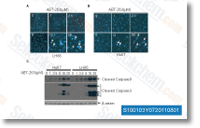Each polyamines and NO have important roles in cellular processes and cell signaling. Nitric oxide and polyamines stimulate cell proliferation and also have a favourable effect on progression as a result of the cell cycle. Polyamines exert their cellular result selleck inhibitor via their capacity to bind nucleic acids and proteins and also have been demonstrated to promote an anti apoptotic state in vari ous cell lines. Also, NO can stimulate PI3K/ Akt one signaling pathways which promote cell survival. The part of L arginine and its metabolites in cell signaling continues to be studied extensively in ovine and porcine trophectoderm cells, with L arginine enhancing cell proliferation by way of mammalian target of rapamycin linked signaling pathways. Wu et al. reported an uncommon abundance of L arginine in porcine allantoic fluid, suggesting a purpose for this specific amino acid in fetoplacental nutrition.
Also, dietary L arginine supplementation has been demonstrated to boost the reproductive AZD6482 overall performance of rats, pigs, and mice, and lately, we now have shown that dietary L arginine supplementation improved the amount of implantation websites in mice, which suggests an impact of L arginine with the level of the endometrium. The endometrium has the potential to catabolized L arginine in many species, which includes sheep, pigs, mice, rats, and people, as a result of presence of NOS and/or arginase enzymes. In addition, L arginine continues to be reported to exist in human uterine lumen flushes with the best concentration observed throughout the proliferative phase, suggesting a doable involvement in endometrial epithelial cell proliferation.
While in the current research we utilized the human endometrial epithelial carcinoma cell line, RL95 2, as being a model for endometrial epithelial cells. The RL95 two cell line expresses markers  uncovered on normal human endometrial epithelial cells this kind of as progesterone receptors, estrogen receptors and B, MUC1, and E cadherin. On top of that, the RL95 two cell line has been utilized extensively as an in vitro model for studying the human endometrial epithelium. To this end, the ob jective of this examine was to examine the result that L arginine could have on endometrial cell proliferation and apoptosis employing the established human endometrial epi thelial cell line, RL95 2, as an in vitro model for epithe lial cells from the human endometrium. Approaches Cell culture Human endometrial carcinoma cells were acquired from the American Variety Cul ture Collection. Cells were cultured inside a humidified incubator containing 5% CO2 applying a finish growth media comprised of DMEM,F12 media supplemented with 10% fetal bovine serum, 1% peni cillin/streptomycin, and 0.
uncovered on normal human endometrial epithelial cells this kind of as progesterone receptors, estrogen receptors and B, MUC1, and E cadherin. On top of that, the RL95 two cell line has been utilized extensively as an in vitro model for studying the human endometrial epithelium. To this end, the ob jective of this examine was to examine the result that L arginine could have on endometrial cell proliferation and apoptosis employing the established human endometrial epi thelial cell line, RL95 2, as an in vitro model for epithe lial cells from the human endometrium. Approaches Cell culture Human endometrial carcinoma cells were acquired from the American Variety Cul ture Collection. Cells were cultured inside a humidified incubator containing 5% CO2 applying a finish growth media comprised of DMEM,F12 media supplemented with 10% fetal bovine serum, 1% peni cillin/streptomycin, and 0.
Microrna Mimics
The use of microRNA mimics to suppress EMT has expanded to other cancer cell lines and holds potential for clinical drug development.
